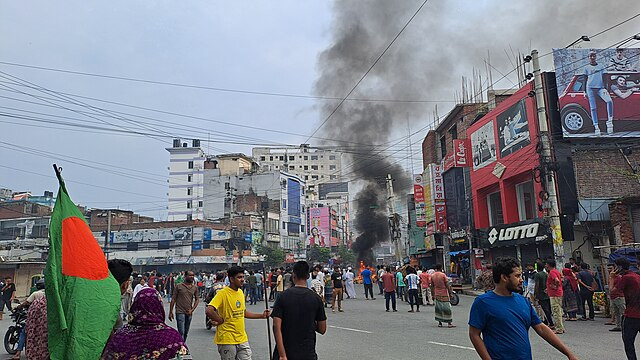Nobel Peace Prize laureate Muhammad Yunus has been asked to lead an interim government in Bangladesh following the resignation and flight of long-serving Prime Minister Sheikh Hasina. This decision comes in the wake of a powerful student-led protest movement that has swept through the country, culminating in the demand for new leadership.
The call for Yunus to take the helm was spearheaded by Nahid Islam, a 26-year-old sociology student who has been a prominent figure in the protests. "We want to see the process rolling by the morning," Islam stated in a video post, urging the president to swiftly form an interim government headed by Yunus. President Mohammed Shahabuddin responded by announcing the dissolution of parliament and the promise of new elections.
The protests began as a reaction to a controversial quota system for government jobs that students claimed unfairly favored those with connections to Hasina's Awami League party. What started as a call for job reform quickly escalated into a nationwide movement against Hasina's administration, driven by frustration over economic distress and accusations of corruption and authoritarianism.
Hasina's abrupt departure marks the end of a 15-year tenure characterized by a heavy-handed approach to dissent and allegations of election rigging. Over the past month, the streets of Dhaka and other cities have been scenes of intense unrest, with protesters clashing with police and demanding Hasina's resignation. The situation reached a boiling point on Monday when demonstrators defied a military curfew, setting fire to Hasina's official residence and massing outside the parliament building.
Yunus, 84, known as the "banker to the poor," received the Nobel Peace Prize in 2006 for his pioneering work in microfinance, which has helped lift millions out of poverty. Despite facing corruption accusations during Hasina's rule, Yunus has maintained that the charges were politically motivated. His spokesperson confirmed that he has agreed to return to Bangladesh to lead the interim government after a minor medical procedure in Paris.
The army, under the temporary control of General Waker-Uz-Zaman, has pledged to investigate the recent violence and restore order. At least 135 people have died since mid-July in what has been described as some of the worst bloodshed since Bangladesh's 1971 war of independence. "Keep faith in the military. We will investigate all the killings and punish the responsible," said General Zaman.
In a move that signals a potential shift in the political landscape, the figurehead president, Shahabuddin, announced the immediate release of opposition leader Begum Khaleda Zia, who has been a staunch rival of Hasina. Zia, convicted of corruption in 2018, has denied the charges and her release is seen as a conciliatory gesture to the opposition.
The unrest has been driven by deep-seated economic issues, including high unemployment and inflation. Bangladesh, despite experiencing strong economic growth under Hasina, has struggled in the post-pandemic era. More than 30 million people in the nation of 170 million are not in work or education, fueling discontent among the youth.
The student-led protests have been hailed as a "Gen Z revolution," highlighting the power and determination of the younger generation to effect change. "This might very well be the first successful Gen Z led revolution," said Sabrina Karim, associate professor of government at Cornell University.
Despite the celebrations following Hasina's resignation, the path ahead remains uncertain. The formation of the interim government and the role of the military will be critical in shaping the future of Bangladesh. Protest leader Muhammad Nahid Islam emphasized that the movement's goals have not been fully achieved and called for the abolition of "fascist systems" in the country.




